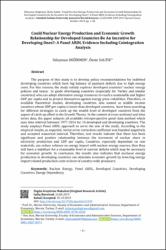Could Nuclear Energy Production and Economic Growth Relationship for Developed Countries Be An Incentive for Developing Ones?: A Panel ARDL Evidence Including Cointegration Analysis
Özet
The purpose of this study is to develop policy recommendations for indebted developing countries which have big balance of payment deficits due to high energy costs. For this reasons, the study initialy explores developed countries’ nuclear energy policies and hence, to guide developing countries (especially for Turkey and similar countries) who can adopt alternative energy resources to reach a sustainable and higher GDP per capita and to protect themselves against energy price volatilities. Therefore, in available theoretical studies, developing countries, also named as middle income countires whose GDP per capita is lower than developed countries, have been searching for different strategies to catch up the wealth level of developed countires from the aspect of catch-up effect in the Growth Theory. In the context of cross sectional and time series data, the paper anlaysis all available retroperspective panel data method which uses time interval between 1977-2014 for 14 developed and developing countires. The study employs Panel ARDL approach to serve the aim of the study. According to the emprical results, as expected, vector error correction coefficient was founded negaitvely and accepted numerical interval. Therefore, test results indicate that there has been significant and positive relationship between the increment of nuclear share in electricity production and GDP per capita. Countries, especially dependent on raw materials, can reduce reliance on energy import with nuclear energy sources, then they will have a stabilizer for a reasonable level of current deficits which may be necessary for economic growth. In conclusion, the results also indicates that nucluear energy production in developing countries can stimulate economic growth by lowering energy import related production costs in favor of country-wide producers. Bu çalışmanın amacı yüksek enerji maliyetleri nedeniyle ödemeler dengesi bilançosu büyük açık veren gelişmekte olan ülkeler için politika önerilerinde bulunmaktır. Bu nedenle, çalışmanın ilk hedefi gelişmiş ülkelerin nükleer enerji politikalarının ortaya konulması, böylece sürdürülebilir ve daha yüksek kişi başı gelir ve enerji fiyatlarındaki oynaklıklara karşı kendilerini koruma altına alabilmeleri için (özellikle Türkiye ve benzeri ülkeler) gelişmekte olan ülkelerin alternatif enerji politikalarını adapte etmelerine sevk etmektir. Bu hedefler, gelişmiş ülkelerden daha düşük kişi başına sahip gelişmekte olan ülkeler veya bir diğer adıyla orta gelirli ülkelerin, Büyüme Teorisi’nde yakalama etkisi olarak bilinen gelişmiş ülkelerin refah seviyelerini ulaşmalarına ve bu anlamda aradıkları alternatif stratejilerinin tespitine yardımcı olacaktır. Bu sebeple, kısıtlı yatay kesit ve zaman serileri üzerinden, 14 gelişmiş ve gelişmekte olan ülke ve 1977- 2014 dönemlerine panel veriler kullanılmıştır. Çalışmanın amacına hizmet etmesi adına Panel ARDL yaklaşımı kullanılmıştır. Ampirik bulgular, beklendiği gibi, hata düzeltme katsayısı negatif ve istenen aralıkta tespit edilmiştir. Bulgular elektrik üretiminde nükleer üretimin artması ile kişi başına düşen GSYİH arasında anlamlı ve pozitif bir ilişkiyi gösterirken, bu tür enerji üretim fikrine karşı kişilerin gelişmekte olan ülkelerde nükleer tipi enerji üretiminin alternatif olarak tavsiye edilmesini mümkün kılabilecektir.
Cilt
6Sayı
GELISIM-UWE 2019 Special IssueBağlantı
https://hdl.handle.net/11363/1485Aşağıdaki lisans dosyası bu öğe ile ilişkilidir:


















